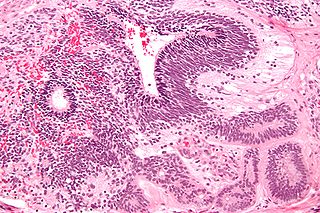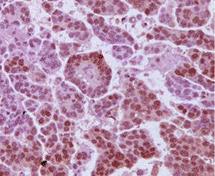
The University of Toledo College of Medicine and Life Sciences is a medical school affiliated with the University of Toledo, a public university located in Toledo, Ohio, United States. The College is located on the University of Toledo's Health Science Campus in south Toledo.

Gestational trophoblastic disease (GTD) is a term used for a group of pregnancy-related tumours. These tumours are rare, and they appear when cells in the womb start to proliferate uncontrollably. The cells that form gestational trophoblastic tumours are called trophoblasts and come from tissue that grows to form the placenta during pregnancy.

Ovarian clear-cell carcinoma, or clear-cell carcinoma of the ovary, also called ovarian clear-cell adenocarcinoma, is one of several subtypes of ovarian carcinoma – a subtype of epithelial ovarian cancer, in contrast to non-epithelial cancers. According to research, most ovarian cancers start at the epithelial layer which is the lining of the ovary. Within this epithelial group ovarian clear-cell carcinoma makes up 5–10%.

The International Federation of Gynaecology and Obstetrics, usually just FIGO ("fee'go") as the acronym of its French name Fédération Internationale de Gynécologie et d'Obstétrique, is a worldwide non-governmental organisation representing obstetricians and gynaecologists in over one hundred territories. It was founded on 26 July 1954 in Geneva, Switzerland, to "promote the well-being of women and to raise the standard of practice in obstetrics and gynaecology". Membership is currently composed of 132 professional societies of obstetricians and gynaecologists worldwide.

Vulvar cancer is a cancer of the vulva, the outer portion of the female genitals. It most commonly affects the labia majora. Less often, the labia minora, clitoris, or vaginal glands are affected. Symptoms include a lump, itchiness, changes in the skin, or bleeding from the vulva.
The Society of Gynecologic Oncology (SGO), headquartered in Chicago, Illinois, is the premier medical specialty society for health care professionals trained in the comprehensive management of gynecologic cancers, affecting the uterus, fallopian tubes, ovaries, cervix, vagina, and vulva. As a 501(c)(6) organization, the SGO contributes to the advancement of women’s cancer care by encouraging research, providing education, raising standards of practice, advocating for patients and members and collaborating with other domestic and international organizations.
Vaginal cancer is an extraordinarily rare form of cancer that develops in the tissue of the vagina. Primary vaginal cancer originates from the vaginal tissue – most frequently squamous cell carcinoma, but primary vaginal adenocarcinoma, sarcoma, and melanoma have also been reported – while secondary vaginal cancer involves the metastasis of a cancer that originated in a different part of the body. Secondary vaginal cancer is more common. Signs of vaginal cancer may include abnormal vaginal bleeding, dysuria, tenesmus, or pelvic pain, though as many as 20% of women diagnosed with vaginal cancer are asymptomatic at the time of diagnosis. Vaginal cancer occurs more frequently in women over age 50, and the mean age of diagnosis of vaginal cancer is 60 years. It often can be cured if found and treated in early stages. Surgery alone or surgery combined with pelvic radiation is typically used to treat vaginal cancer.
Gynecologic oncology is a specialized field of medicine that focuses on cancers of the female reproductive system, including ovarian cancer, uterine cancer, vaginal cancer, cervical cancer, and vulvar cancer. As specialists, they have extensive training in the diagnosis and treatment of these cancers.
Gynecologic cancer is a type of cancer that affects the female reproductive system, including ovarian cancer, uterine cancer, vaginal cancer, cervical cancer, and vulvar cancer.
Steven A. Vasilev is an American gynecologist, specializing in gynecologic oncology. He has served as Professor and Director of Integrative Medicine and Gynecologic Oncology at John Wayne Cancer Institute-Providence Saint John’s Health Center, Professor at John Wayne Cancer Institute in Santa Monica, California, and Professor at Loma Linda University School of Medicine faculty. Vasilev is a proponent of minimally invasive (laparoscopic) and robotic cancer surgery and complex pelvic surgery and has published research on medical and surgical therapies, integrative medicine, and screening for cervical cancer and human papilloma virus (HPV)

An immature teratoma is a teratoma that contains anaplastic immature elements, and is often synonymous with malignant teratoma. A teratoma is a tumor of germ cell origin, containing tissues from more than one germ cell line, It can be ovarian or testicular in its origin. and are almost always benign. An immature teratoma is thus a very rare tumor, representing 1% of all teratomas, 1% of all ovarian cancers, and 35.6% of malignant ovarian germ cell tumors. It displays a specific age of incidence, occurring most frequently in the first two decades of life and almost never after menopause. Unlike a mature cystic teratoma, an immature teratoma contains immature or embryonic structures. It can coexist with mature cystic teratomas and can constitute of a combination of both adult and embryonic tissue. The most common symptoms noted are abdominal distension and masses. Prognosis and treatment options vary and largely depend on grade, stage and karyotype of the tumor itself.
Primary fallopian tube cancer (PFTC), often just tubal cancer, is a malignant neoplasm that originates from the fallopian tube.

Uterine serous carcinoma is a malignant form of serous tumor that originates in the uterus. It is an uncommon form of endometrial cancer that typically arises in postmenopausal women. It is typically diagnosed on endometrial biopsy, prompted by post-menopausal bleeding.
Jonathan S. Berek, MD MMS is the Laurie Kraus Lacob Professor at the Stanford University School of Medicine, Director of the Stanford Women's Cancer Center, and Senior Advisor, Stanford Cancer Institute. He is a recent past Fellow in the Stanford Distinguished Careers Institute.

High-grade serous carcinoma (HGSC) is a type of tumour that arises from the serous epithelial layer in the abdominopelvic cavity and is mainly found in the ovary. HGSCs make up the majority of ovarian cancer cases and have the lowest survival rates. HGSC is distinct from low-grade serous carcinoma (LGSC) which arises from ovarian tissue, is less aggressive and is present in stage I ovarian cancer where tumours are localised to the ovary.
Sven Becker is a German gynaecologist, gynaecologic surgeon, and oncologist.

Gynecologic cancer disparities in the United States refer to differences in incidence, prevalence, and mortality from gynecologic cancers between population groups. The five main types of gynecologic cancer include cervical cancer, ovarian cancer, endometrial cancer, vaginal cancer, and vulvar cancer. For patients with these and other gynecologic malignancies within the United States, disparities across the care continuum by socioeconomic status and racial/ethnic background have been previously identified and studied. The causes behind these disparities are multifaceted and a complex interplay of systemic differences in health as well as individual patient factors such as cultural, educational, and economic barriers.
Dineo Khabele is an American obstetrician who is Mitchell and Elaine Yanow Professor of Obstetrics and Gynecology at Washington University in St. Louis. In 2019 Khabele was elected to the American Society for Clinical Investigation.
Bradley J. Monk is an American gynecologic oncologist, academician and researcher. He is a Professor on the Clinical Scholar Track in the Department of Obstetrics and Gynecology at the University of Arizona College of Medicine in Phoenix, Arizona, as well as at the Creighton University School of Medicine in Omaha, Nebraska. He also serves as Director of the Division of Gynecologic Oncology at the St. Joseph's Hospital and Medical Center in Phoenix.
Beth Young Karlan is an American gynecologic oncologist. In 2008, she was named editor-in-chief of the medical journals Gynecologic Oncology and Gynecologic Oncology Reports. In 2012, Karlan was appointed by the White House to serve on the National Cancer Advisory Board, and in 2015, she was elected to the National Academy of Medicine.








